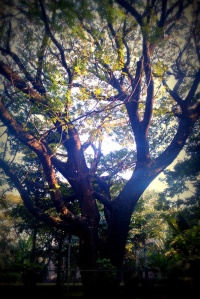Musings from India about Movies, Music, Startups, Technology, Travel and Photography...
Sunday, January 23, 2011
This dominating, awesome Shirish tree
Summer seems just around the corner and winter is almost over.
The tree has started shedding its leaves to welcome yet another summer...so it is almost snowfall of thousand leaves with every breeze of wind.
Lucky to have such a beautiful location for workplace in Pune!
Saturday, January 22, 2011
History of Microsoft Excel [Videos]
[Update: Excel turned 25 a few days ago!]
Office - Excel is one the most awesome piece of softwares ever written. Here is its history -
Part I:
[youtube http://www.youtube.com/watch?v=ZodlyeiQeIo]
Part II:
[youtube http://www.youtube.com/watch?v=D2PgYGK85lI]
Sunday, January 16, 2011
Why India Is Corrupt?
Can we trace the reason of corruption in Indian society to her culture? Is there any correlation between a highly religious society (Catholics, Hindu) and high levels of corruption?
These are some of the interesting questions asked by Aakar Patel in his piece in Mint today.
Though anybody would agree that corruption is not so simple a phenomenon, there seems to be atleast some truth in what he has hypothised in the article. Ambiguity or complexity or dogmatism in religious code can be a reason which leads to a self-deceptive individual and a similar society.
Actually Fred Riggs, an influential thinker, has a beautiful model which can be more helpful in tracing the causes of corruption. He talked about three types of societies - Agraria (primitive societies where there is little development of structures and functions), Industria (developed societies where there are clearly developed structures and respective functions), and Transitia (a society which is in transition from an agrarian society to an industrial society).
Riggs's model was based on his observations about the third world - first world classification, to which he later added 'Developing World' - typified by a Transitia society.
These societies which are in transition, in some way or the other, are more susceptible to corruption. These societies are characterized by three qualities - heterogeneity (i.e. simultaneous existence of traditional as well as modern viewpoints and structures), formalism (i.e. there exists a difference between what is formally prescribed and what is actually followed.), and overlapping (i.e. modern and traditional methods/practices/structures/behaviours overlap. E.g. A court takes cognizance of a case only when there are riots).
From these characteristics of the prismatic society, it is clear why corruption is a practice in such societies. We can also see a clear picture of Indian society in the prismatic description.
Let's hope as the Indian society evolves, as we are more transparent about ourselves, there will be a change.

